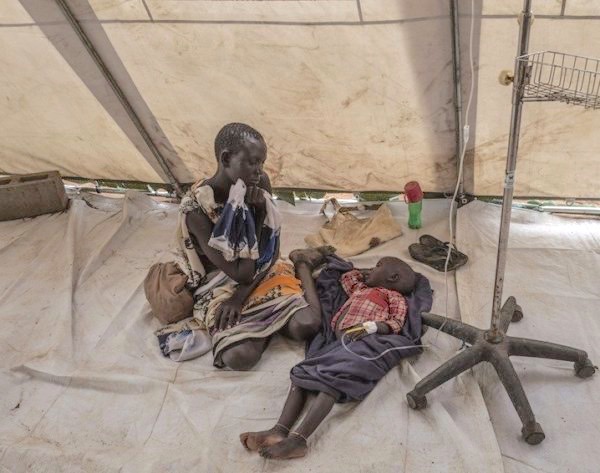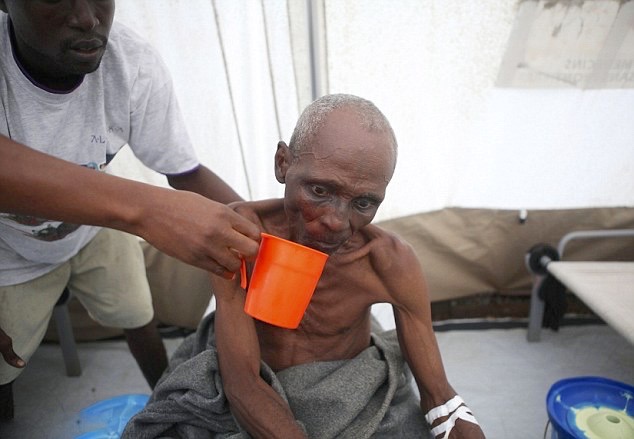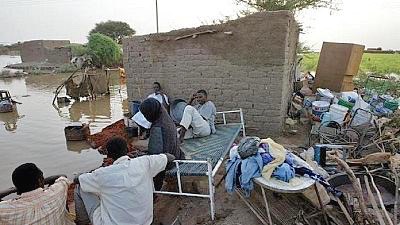Cholera Again Looms in Sudan and the WHO Seems Poised to Remain Silent
Eric Reeves | July 19, 2018 https://wp.me/p45rOG-2gd
Because the cholera epidemic in Sudan was never truly investigated by the UN’s World Health Organization (WHO), despite many opportunities—including most recently during an assessment mission to Darfur—the extremely contagious disease again seems to be on the rise this rainy season, now at its peak (see Radio Dabanga article below). And it has again begun in Blue Nile, as it did at the start of the epidemic in August 2016. The spineless leadership of WHO continues to capitulate to Khartoum’s blind denials of the disease, denials that reflect only the regime’s not wishing the “stigma” of being a country with cholera.

Untreated, cholera can kill in a matter of hours in some cases, especially among children.
A superb, if singular, overview of the cholera crisis in Sudan appeared last year in the Washington Post: “As the death toll climbs in Sudan, officials shy away from the ‘cholera’ label,” September 14, 2017. The article by Glenn Kessler begins in stark fashion:
As of July 7, health actors had recorded more than 23,200 cases of acute watery diarrhea (AWD) since August 2016, according to the U.N. World Health Organization (WHO) and the Government of Sudan (GoS) Ministry of Health (MoH).”
— U.S. Agency for International Development, fact sheet, July 27, 2017
“The U.S. Embassy in Khartoum informs U.S. citizens that there are confirmed reports of cholera cases in some areas of Sudan, including the greater Khartoum metropolitan area, that have resulted in fatalities.”
— U.S. Embassy in Khartoum, emergency message, June 1 [2017]
The State Department and USAID are related agencies, both reporting to the secretary of state, but there is an odd disconnect in how they have described a looming public health emergency in the African country of Sudan. The embassy declared that there were “confirmed reports” of cholera that have killed people, whereas USAID, citing the World Health Organization and the Sudanese government, said there were cases of “acute watery diarrhea,” known in medical circles as AWD.
The Post traced the origins of the outbreak:
The first indication of a problem in Sudan was in August 2016, when 100 deaths, mainly children, were reported in Sudan’s Blue Nile state. “A medical worker from Blue Nile state revealed an increase in incidences of diarrhea that he believes to be cholera,” reported Radio Dabanga, an independent news source that operates out of the Netherlands with correspondents in the field. “He attributes the spread to polluted water and said that hospitals in the state have to isolate patients with diarrhea to avoid infecting others.”
Warnings went unheeded by the UN’s World Health Organization:
ACAPS, a nonprofit, nongovernmental project that assesses humanitarian needs, on June 16 [2017] issued a report stating that a “cholera outbreak” that started in Blue Nile “began to spread rapidly as of April this year. Conservative estimates suggest a minimum of between 15,000- 23,000 people infected, with 280-820 deaths.” But the group said that without immediate intervention, infection is likely to spread further now that it had reached the densely populated capital of Khartoum. More than 5 million people live in the capital’s metropolitan area.
But Khartoum would have none of this:
Khartoum has actively sought to prevent hospitals, doctors and journalists from reporting that there is a cholera outbreak. As far back as January, doctors reported that laboratory tests on acute diarrhea samples proved that it was cholera. “The management problems at the Health Ministry have impeded containment of the disease. Instead of acknowledging the disease and taking measures to prevent the spread of cholera during the past six months, the authorities opted for not announcing the test results,” said one doctor.
And the leadership of the World Health Organization, in a scandalous abrogation of its mission obligations, declared simply: “’WHO has not received any lab results to date that confirm cholera in Sudan,’ said Gregory Hartl, a WHO spokesman.” But what Hartl does not say is that WHO could easily have obtained lab results or conducted laboratory tests of its own. What was missing weres not “lab results” but the courage to fulfill the primary obligation of WHO’s self-declared mandate: “Providing leadership on matters critical to health and engaging in partnerships where joint action is needed.”
Cholera victim in Sudan, 2017
Certainly WHO was well aware that its failures had been recognized by physicians. The Post reported:
In an open letter to WHO, a group of U.S. physicians have decried “WHO’s failure to confirm or disconfirm the findings of Sudanese labs tests in Geneva, using stool samples appropriately transferred from Sudan.” Addressing WHO Director-General Tedros Adhanom Ghebreyesus, the letter said: “Your failure to transport stool samples from victims in Sudan to Geneva for official confirmation of cholera makes you fully complicit in the terrible suffering and dying that continues to spread, out of control, with daily new reports confirming that this is indeed a cholera epidemic.”
Tragically, this letter was unheeded and Sudan seems to be on the brink of another cholera outbreak of unknown dimensions. No adequate preparations are being made (which should include rapid and widespread deployment of cholera vaccines), and the people of Sudan are yet again victims of a viciously and narrowly self-interested regime of kleptocrats. (It hardly helps the overall health situation in the country that some 200 medicines are no longer available in Sudan because of economic collapse, and inflation has seen the price of some medicines rise by 300% this year alone.)
WHO will again be complicit if, as seems all too likely, Sudan is afflicted by another cholera epidemic.
“Watery diarrhoea” reported in Sudan’s Red Sea state | Radio Dabanga, July 11, 2018 | DERUDEB (Red Sea State)
The hospital of Derudeb in Sudan’s Red Sea state recorded eight cases of acute watery diarrhoea – which is often caused by cholera – on Tuesday following intense rains in the area.
Activists reported: “The town is witnessing severe environmental deterioration after the rainfall” and pointed to the widespread spread of flies and pollution of water sources. In addition, they pointed out to the deterioration of the environment of the hospital of Derudeb, which is lacking most of the basic health services. They said the residents are forced to travel 300 kilometres to Port Sudan for treatment. They called on state and federal health authorities to urgently intervene to contain the disease.
[The lack of basic health services is a hallmark of the Khartoum regime’s gross mismanagement of Sudan’s economic resources for three decades—ER]
As previously reported by Radio Dabanga, six cases of acute watery diarrhoea were admitted to Ed Damazin Hospital in Sudan’s Blue Nile State last month.
[It is extremely likely that these are again cases of cholera, and yet still the UN’s World Health Organization will not test the people afflicted. This greatly increases the chances that, if cholera, it will spread to much of Sudan, as it did in 2016, including Darfur until earlier this year—ER]
Sudan has experienced an epidemic since 2016, which the Sudanese government insists on calling ‘watery diarrhoea’ in spite of numerous independent confirmations (conducted according to WHO standards) that the disease which broke out in Blue Nile state in August 2016 was cholera, the Sudanese authorities and several international organisations persistently refer to it as ‘acute watery diarrhoea’.
[“Numerous independent confirmations (conducted according to WHO standards)” showed that the disease was in fact cholera—something the World Health Organization neither investigated, nor has it neither recognized the validity of this testing. This is nothing less than a shameful capitulation to the refusal of the Khartoum regime to have the word “cholera” used, despite all evidence that it is—ER]
In May, Sudan’s federal Minister of Health, Bahr Idris Abu Garda, declared that Sudan is now free of the ‘watery diarrhoea’ outbreak (suspected to be cholera) that hit various parts of the country during the past year.
[We should expect nothing but more lies from the Khartoum regime even if tests again proved that the disease is in fact cholera. Sadly, we should expect the World Health Organization again to capitulate before the regime’s obduracy—ER]
Living and health conditions in most of Sudan make it a prime target for cholera

